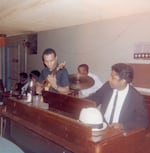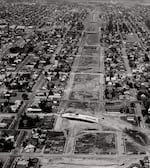Walk down North Williams Avenue near the intersection with Northeast Tillamook Street and you’ll find a leafy stretch of sidewalk lined with new apartments. The road swells during rush hour, as cars and commuters on bicycles stream by interrupting the ever-present hum of Interstate 5. Other than that, it’s mostly devoid of excitement except for the occasional ambulance heading to nearby Emanuel Medical Center.
You’d never guess that this block was once the beating heart of Portland soul music.
“The biggest difference is you walk into a place that you used to go and there were Black people in there,” says Paul Knauls of this corner of the historically Black Albina neighborhood. “Now they’re white people that own the place and you feel like a total stranger.”
For decades, Knauls was a business owner in Albina. His presence there was so ubiquitous that he’s still widely referred to as “The Mayor Of Northeast Portland.” But today, even he feels like an outsider here.
“And so all on Williams Avenue, all those spots that we used to go. You don’t feel welcome. So you basically don’t go,” he says.
The cultural shift is striking.
In the 1960s, the surrounding area was home to multiple Black-owned music venues like the Texas Playhouse, Upstairs Lounge, and Fred’s Place that hosted national touring acts and supported a bustling local music scene featuring dozens of soul, jazz, funk and R&B bands.

The band Rated X featured Norman Sylvester who is one of the narrators of The Albina Soul Walk.
Courtesy of Norman Sylvester
The Soul Walk is born
An ambitious new self-guided audio tour of Albina aims to chronicle the heyday of that music scene and its untimely demise. But according to the project’s director, documentarian Megan Hattie Stahl, the original concept had modest aims.
“At first I was like ‘OK, this is just going to be a tour of former music venues.’ And I thought it was going to be as simple as that,” Stahl says.
She reached out to Oregon Music Hall Of Fame member Calvin Walker and asked him to be one of the narrators of what would eventually become The Albina Soul Walk.
“When [Stahl] first started talking about the idea, I was like ‘This is some silly shit. We’re going to go and stand in front of this empty space and reimagine ourselves in 1969?’” says a clearly amused Walker, who grew up in the neighborhood.
“But I do want people to know that this was a thriving community and there’s a reason why it isn’t anymore,” he adds.
Walker quickly came around once he realized that Stahl was eager to tell that more complex story.
“That’s something that became clear soon after I actually dug into it and started talking to these elder community members,” Stahl says. “It needs to not just be a time capsule of joy and happiness because this community has suffered so much through urban renewal projects and gentrification and displacement that it can’t just exist in this happy world of the music scene. It has to be connected to the outer world.”

Veteran musician Calvin Walker (left) is one of the narrators of The Albina Soul Walk. Paul Knauls (right) owned the legendary Portland jazz and R&B venue the Cotton Club.
Sam Salter / Courtesy of the Albina Music Trust
To make that connection, she relied on interviews with surviving musicians and club owners from the neighborhood and teamed up with an archivist named Bobby Smith.
“This is a peoples’ history and the work that we’re doing here is memory activism,” says Smith, who means that in the most literal way possible.
For the past decade, he’s interviewed key players in Albina music history (Smith hosts the radio show Night School on XRAY.fm in Portland), tracked down sometimes forgotten recordings and helped to digitize that music through work with the nonprofit Albina Music Trust.
“There’s basically a family tree that has extended out from musician to musician, band to band,” Smith says. “And we’re just kind of in the process of taking very raw and high quality [digital] transfers of this material to keep it all in one place to preserve it for future generations.”
Ground zero for Portland soul
Portland’s soul and R&B music history is a sprawling subject, covering decades, hundreds of voices, and dozens of music venues. But Smith, who directed the music for The Albina Soul Walk, says virtually everyone he spoke with knew exactly where the new audio documentary should begin.
“We started at ground zero, which is the Cotton Club,” Smith says. “That is the hub for soul music [in Portland].”
During the 1960s, Paul Knauls owned and operated the nightclub. Known for booking some of the best musicians in the region, he openly boasted that it was “the only club on the West Coast with wall-to-wall soul.”

Soul jazz outfit Billy Larkin & The Delegates was a staple of the Portland music scene in mid-'60s.
Courtesy of Paul Knauls, Sr.
Even at 90 years old, Knauls’ memories of the Cotton Club are as vivid as ever. And naturally, he features heavily in The Albina Soul Walk, sharing memories ranging from an incredible story about the night legendary singer Etta James played the venue to the makeup of his clientele.
“It was the place to see and be seen. People dressed up to come there,” Knauls recalls. “All the people underage wanted to come, so my job mostly was to try to keep the 18-, 19- and 20-year-olds out because you had to be 21.”
While Knauls is happy to reminisce about Albina’s musical past, he’s quick to mention that the neighborhood had more than just nightclubs.

In the heart of the Albina district, the corner of North Williams and North Russell was once the center of a small yet thriving business district. These businesses were torn down in the early 1970s as part of large-scale urban renewal projects. Photo circa 1962.
Courtesy of The Oregon Historical Society (#bb009732)
“I recall over 100 Black businesses that were in the neighborhood,” says Knauls before rattling off a list that includes everything from restaurants to oil companies.
“Everything we needed. We didn’t have to go out of our neighborhood,” he says.
A devastated community
The Black-owned establishments in Albina and the families that patronized them began to disappear. Knauls blames a botched expansion of Emanuel Hospital in the early 1970s that resulted in the bulldozing of 80 homes acquired via eminent domain.
But that was on the heels of an even more destructive event that occurred only a decade before, when construction of Interstate 5 pushed out longtime residents, destroyed businesses, and bisected the neighborhood.
“And nobody was thinking about it. Nobody was going ‘If we put a freeway through here it might disturb the Black community,’” Albina Soul Walk narrator Calvin Walker says.

The construction of Interstate 5 through North Portland in 1963 resulted in the destruction of hundreds of homes and businesses and bisected the historically Black Albina neighborhood.
City of Portland (OR) Archives, A2005-001.427
Walker says that over time, federal and state projects like these devastated the neighborhood and effectively killed the music scene. Protests fell on deaf ears.
“They could care less. It’s progress. And anybody that gets displaced? That’s just too bad. That was the basic attitude,” Walker recalls.
The new audio tour addresses these changes largely through stark contrast. It’s clear that today Calvin Walker, Paul Knauls and many of the other voices featured on The Albina Soul Walk have a hard time recognizing their old stomping grounds.
“After all of those years, most of the people are gone and all of the businesses are gone,” Knauls says.
That includes his beloved Cotton Club and nearly all of Albina’s historic music venues.
But Knauls still wants people to know that before the luxury apartments and the hospital expansion and the highway — there was wall-to-wall soul.
The Albina Soul Walk self-guided audio tour is available on the ECHOES mobile app.

